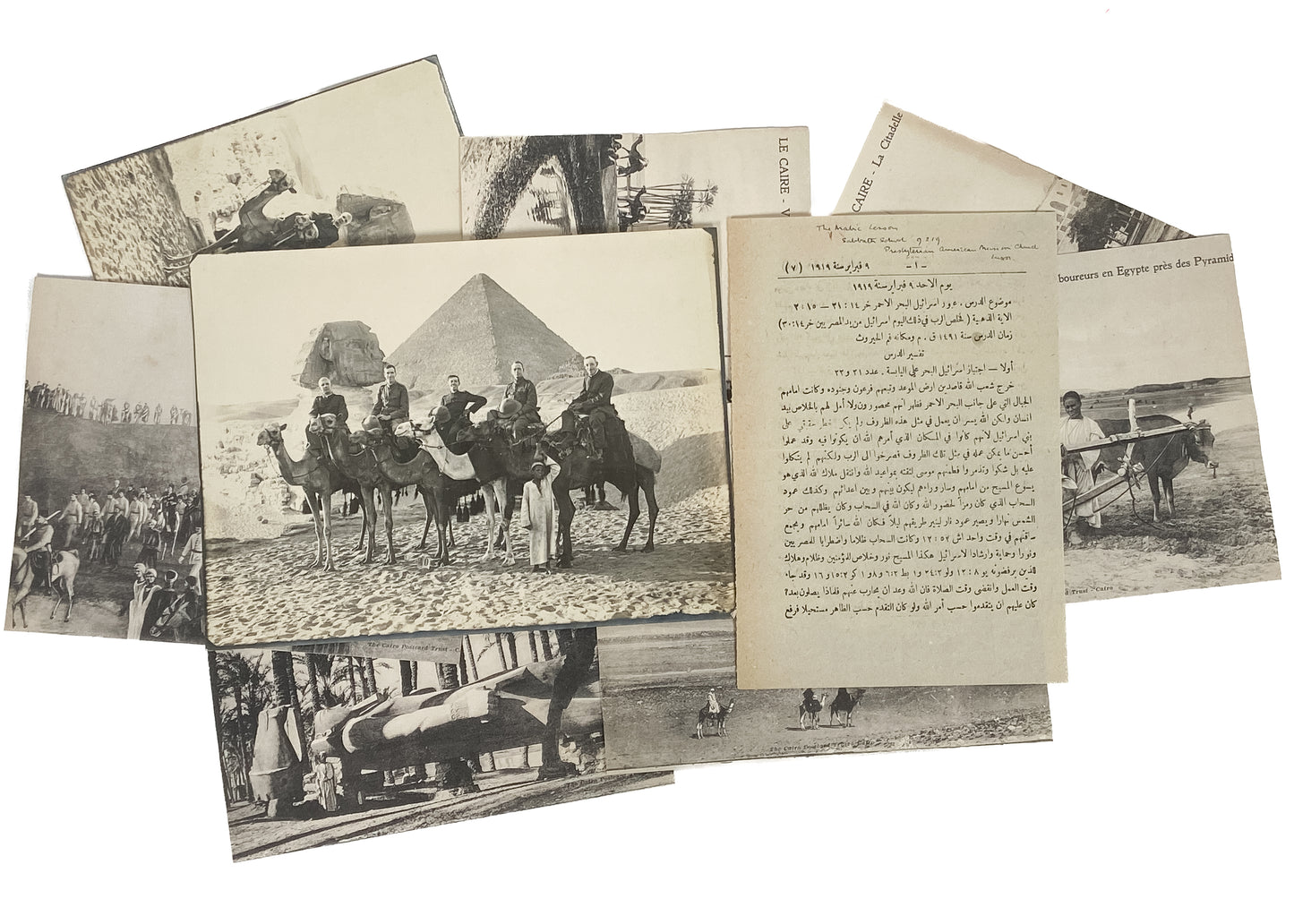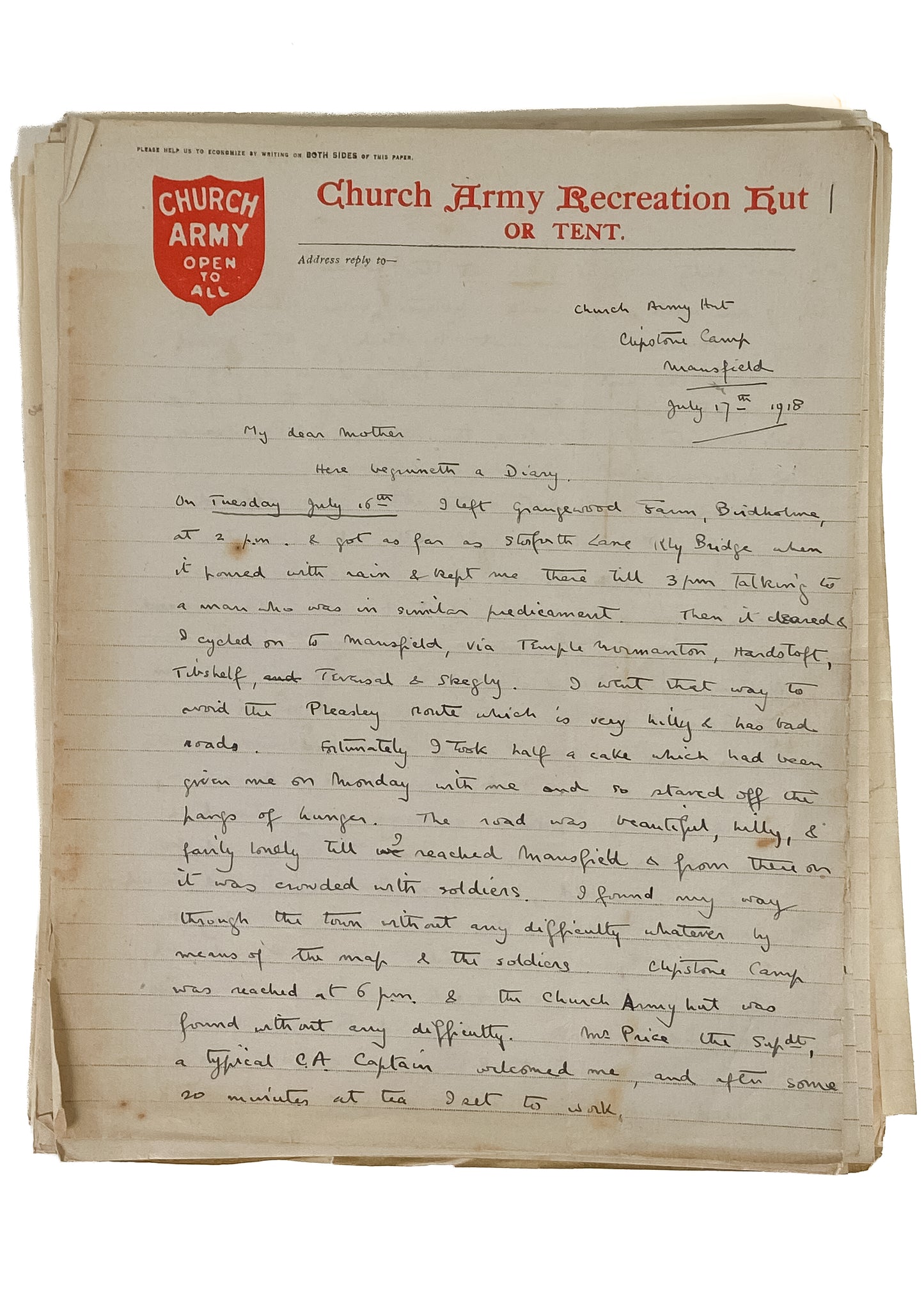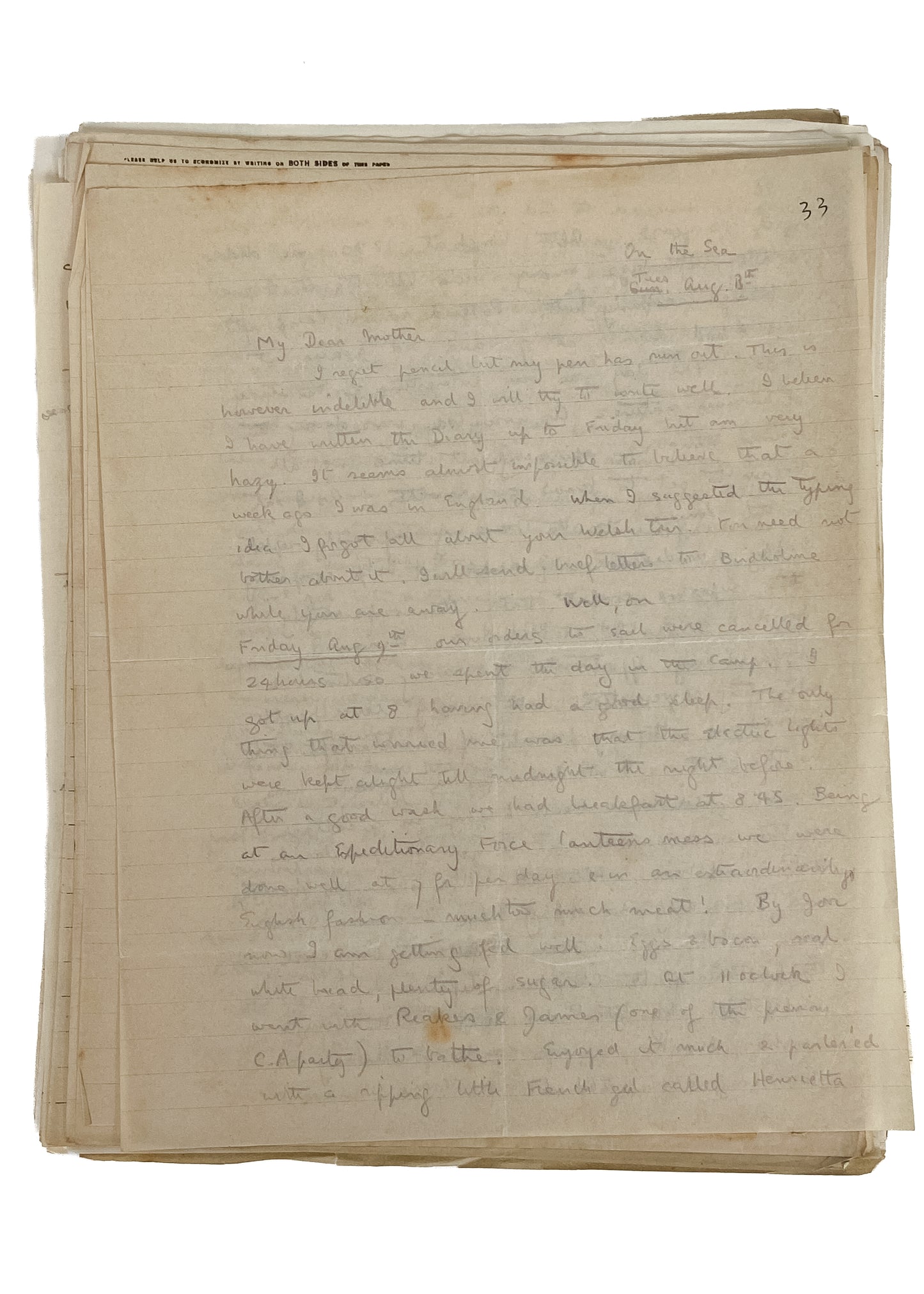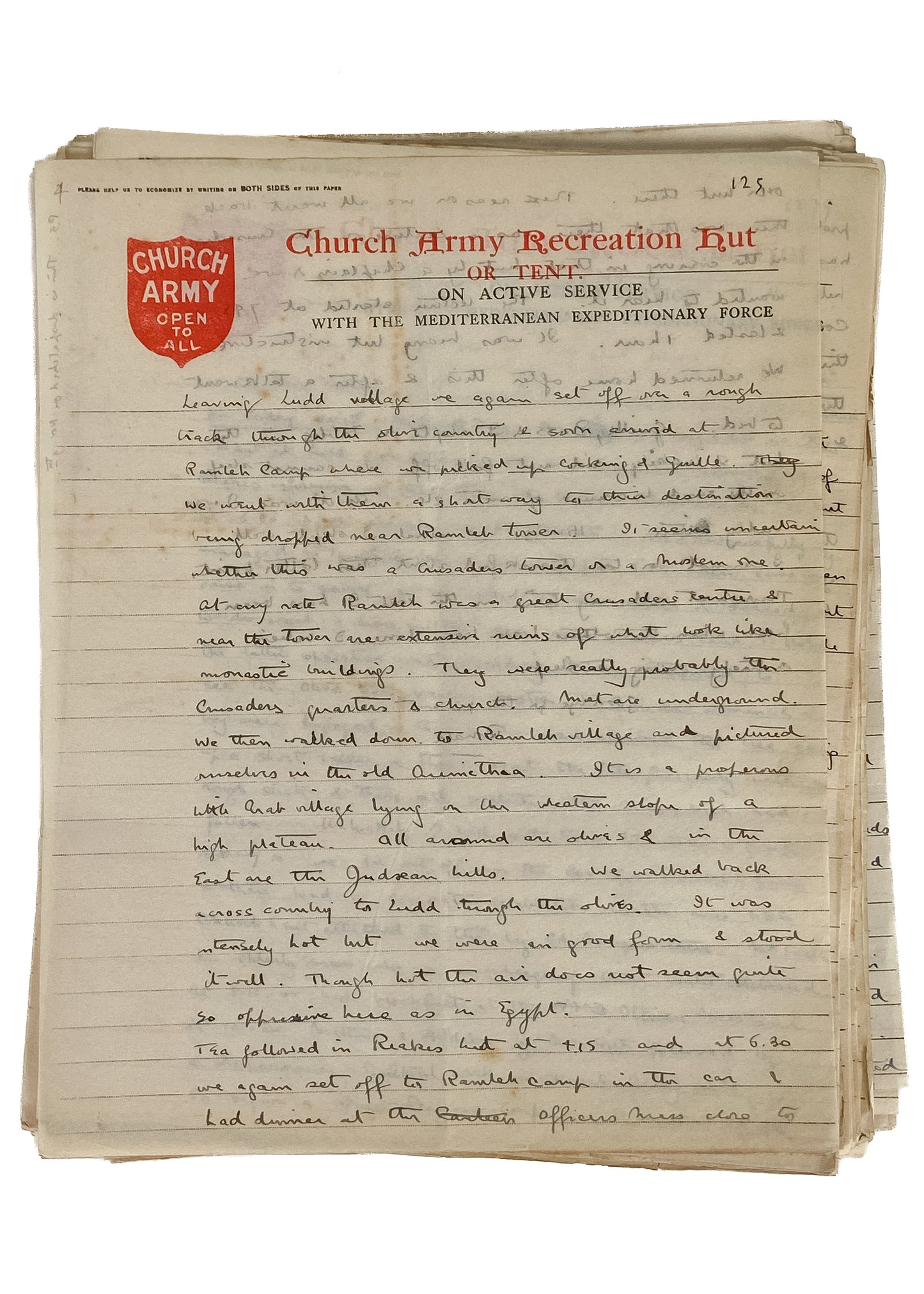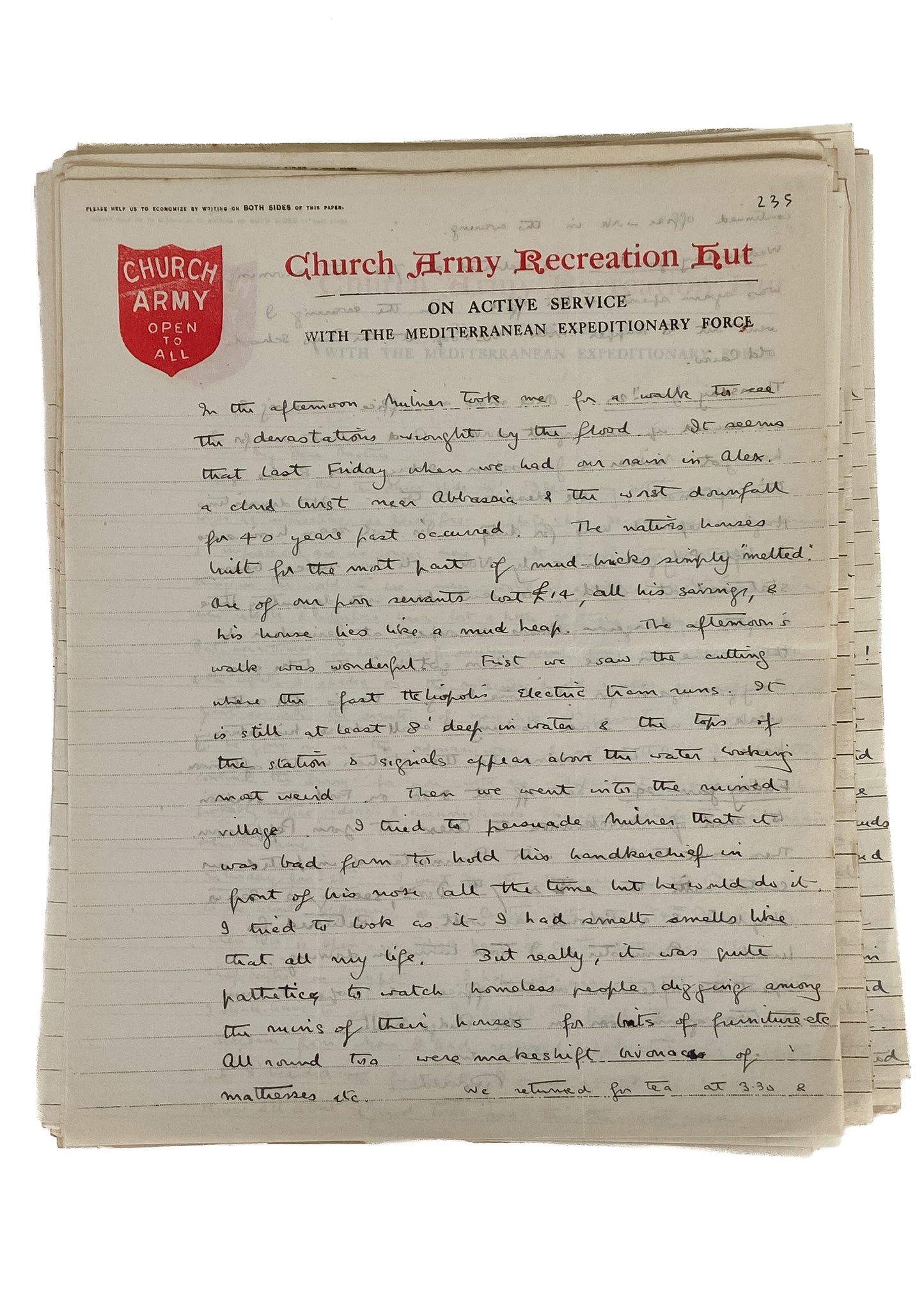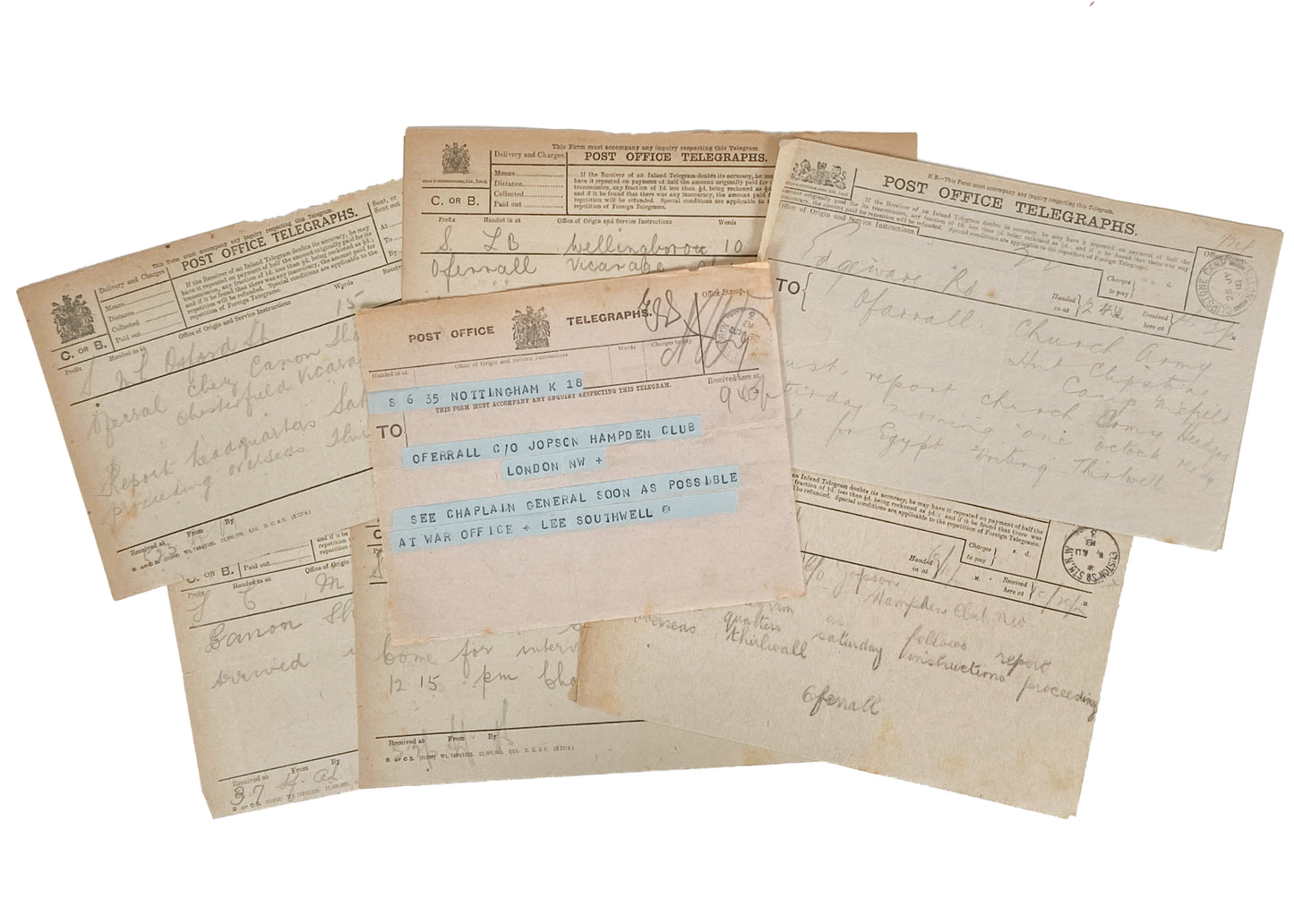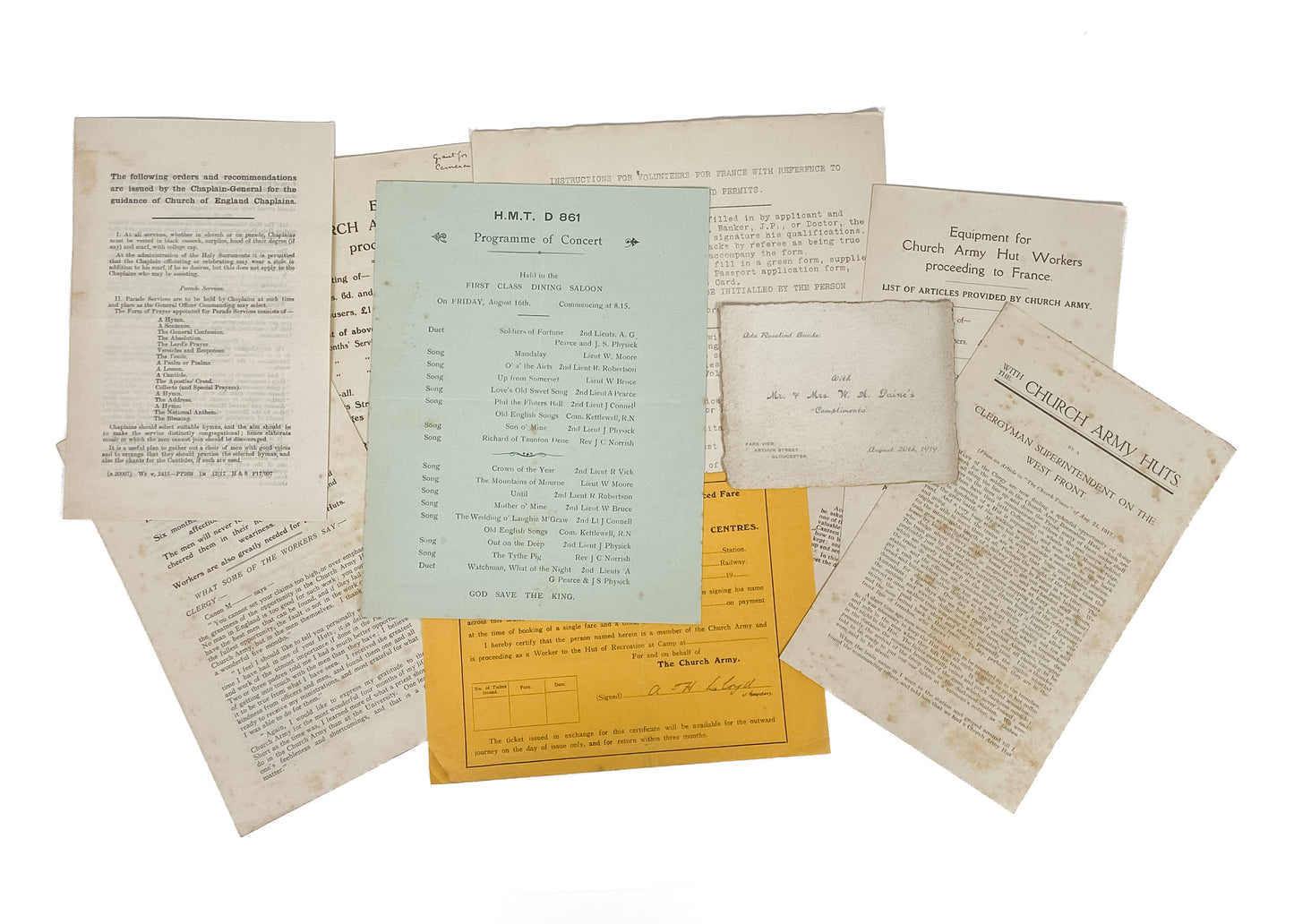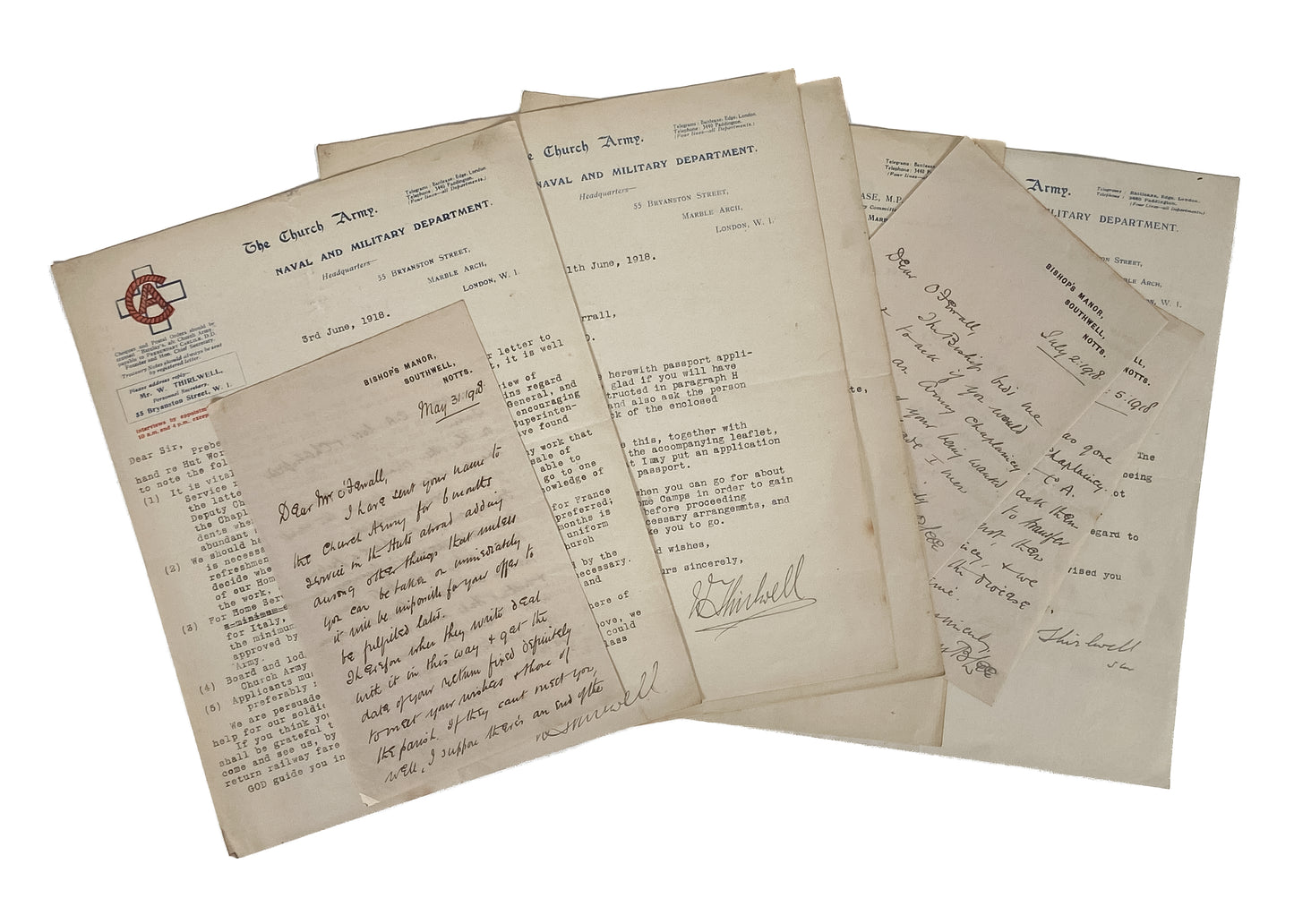Specs Fine Books
1918 WORLD WAR I 450pp Diary with Content on Middle Eastern Travel, Missions, and the War
1918 WORLD WAR I 450pp Diary with Content on Middle Eastern Travel, Missions, and the War
Couldn't load pickup availability
A superb, complete and extensive World War I diary of military Chaplain, Rev. Ronald Stanhope More O’Ferrall [1890-1973].
An unusually comprehensive diary covering military life, details of the war and soldiers, his spiritual care for the soldiers, and extensive content related to his travels in the Middle East and Israel during the War while working under the auspices of a combined effort between the Church Army and adjacently it seems with the YMCA.
In 453 very full, detailed pages, O’Ferrall records his entire course of service, beginning with his departure from Grangewood Farm, Birdholme on July 17, 1918 through the clearing out period of the war, finally heading back to England on August 28, 1919.
Oswald Chambers had himself been a Chaplain to the troops under the auspices of the YMCA in the same region, i.e. Cairo, Egypt, beginning in 1915 through to his death in 1917.
Most of his work was in Cairo and Alexandria. Fascinatingly, he also interacts a fair amount with Fairhaven, the Missionary Rest Home in Egypt founed by Annia Von Summers, friend and co-laborer with Samuel Zwemer. There is also present an Arabic Lesson from the Presbyterian American Mission Church [Zwemer associated].
After the War, O’Ferrall served the Universities Mission to Central Africa in Rhodesia and then as the fourth Bishop of Madagascar [1926-1940], with great success. He was deeply interested in the people and contributed to the preservation of Malagasy culture over and against Colonial interests. To this day, his work on the Antaimoro people, on the Malagasy language, and literature are utilized as important early contributions to their history and anthropology.
The collection includes:
*Nine letters dating from between May 31, 1918 to July 10, 1918 [just ten days before his departure] detailing the recruiting process for Chaplains. Includes letters from William Thirlwell, Secretary of The Church Army – Naval and Military Department, Bishop Edwyn Hoskyns of Southwell, etc.
*Nine print documents related to entering the Chaplaincy, including a proposed order of services for Chaplains issued by the Chaplain-General, a tract on the opportunities afforded Chaplains serving in the Church Army Huts, an Application for Reduced Railway Fares for Members of the Church Army, a tract calling clergy to consider Chaplaincy, an equipment list for packing for Chaplains departing to the War, a notice of first orders for Chaplains [who will be assigned first to one of the Home Camps, etc], Instructions for Chaplains regarding Passports, etc.,
*Nine partially printed and partially handwritten Telegrams, all dated to the travel period of O’Ferrall to his final station.
*Three photographs, two print and one original. The two prints include a view of the Pyramids outside Cairo and the Statue of Memphis. The original photograph, c.7 x 10 inches, shows five officers on camel back in front of the Sphinx and pyramid with a local young guide. The persons are labeled on the rear, including O’Ferrall [second from left].
*And, most significantly, the journal.
The journal begins with his time at “Clipstone Camp” in Mansfield [two weeks] and includes hand-drawn diagrams of a typical “Church Army Recreation Hut,” descriptions of the religious views of other chaplains [one he says a breezy, unconventional, and hazy religion,” accounts of bayonet fighting practice, bomb-throwing drills,
“I’ve heard many complaints that the work is too secular, but it seems to me that for a Tommy to see a parson working hour after hour in his shirt sleeves is worth many a sermon . . . the work seems profitable and & I believe is being blessed.”
“Had a talk with an experienced chaplain. He was an Irishman called O’Malley & had been in France 2 years, and is a thorough pessimist. He said he di not think C.A. was much use, so I asked him if chaplains were any use and he said that 80% were failures.”
“A word about the Tommies; I am very pleased with them and am making many friends and have absolutely no doubt about the value of my work or my call to it at this time.
“Nearly everyone in the Camp is a Machine Gunner or training for it. And so they are all A Men or Grade I as they’re not called. In physique they are magnificent. They do 12 weeks infantry training in a T.R.B. and then 6 weeks with Machine Gun Corps & then go to France. There are 4 or 5 TRB’s, the 84th, 86th, 114th, 115th, 116th, and may be more. Most of them come from South Wales & Scotland, but there are a good many orkshiremen and many odd ones from other parts.”
“The N.C.O.S. are mostly returned men from the front. I can always tell a man who has been “out” by his brown face long before I look for the wound stripe. What strikes me particularly about the men is their behavior – we never behaved half so well at Cambridge I have never yet seen in the hut or in the Camp anything approaching a real nag or grousing. This is really remarkable when you think that they have nearly all come against their will.”
“[Views at Clipstone, during training]. I should say that generally speaking the men think very little of Religion at all, perhaps less than men at home, partly because they are so busy & tired & partly because Army life kills religion. The soul is as a seed & it grows naturally. All army training is mechanical and over & over again it is being proved that machinery kills the soul & individualism. We see men or rather boys coming in here quite individual & even 3 days confirms them to the type. The power & incidentally too the fascination of the army machinery is extraordinary. In spite of all this the prayers we have nightly I am sure are appreciated and a tiny glimmering of the “real things” lies somewhere in the background.”
August 1, 1918. Telegram, “Report Headquarters 1pm Saty. Sail Egypt.”
En route to Egypt I was asked what I thought was the chief work of an army chaplain. I said ‘To try to bring all with whom one came into contact into touch with the Lord Jesus.”
August 6th, 1918 [Somewhere in France]. The Ch. Army, who are most unbusinesslike, had messed the whole thing and we were very lucky to get off at all. . . had a nice night, although the sea was a little rocky. Many were ill.
“We have received very good treatment up to now from all officers we have met except Army Chaplains, who are cold & “offish.”
“The tense expressions of many on board showed the experience was not the same for all, and the order to keep lifebelts always beside us seemed to mar their joy. This was especially true of some who had been previously torpedoed and who knew of terrors unknown to me. . . there were rumors that the port was infested with subs . . . not a light was on board, not even a cigarette and severe penalties followed the striking of a match. Even all the doors leading below except one were locked & it took us some time to find it as we threaded our way through prostrate forms of men who were sleeping on deck in all kinds of positions & places. Every porthole was closed for fear of light & to delay the boat sinking in case of attack. “
[Cairo] My only regret is that military regulation forbids me to assume the tarsbu and long flowing robe & become a native. There is however another risk besides disobeying the rules, one might lose ones head, which would indeed be a pity after seeing so much! The Mohammedans are very excitable & fanatic & one ha salways to be careful in their quarters & it is very undesirable to putter around on Fridays, which is their Sunday. . . Early in the war the cry “Kill the Christians” was heard throughout the city, probably urged on by secret enemy diplomacy.
[Jerusalem] It [Fairhaven] is well known in the land and is the resting place of all Christian religious workers of all denominations. Here we found Denham, another man who came out with me. He is waiting for a boat home, his health having given in altogether. There were several interesting people there. There was a Mr King, a missionary on the Blue or White Nile, I forget which, who is on a long rest & hopes to work for the C.A. a little when he is somewhat rested. There were also one or two ladies just released from Smyrna. The place is of the old fashioned Protestant type & is steeped in Bibliolatry. There are no pictures. . . . in the evenings the glorious old lady talks of Ango-Israelism & the interpretation of the sacred numbers & other prophecies. Then follows an example of her teaching. [The “glorious old lady” would have been Annie Von Summer, co-worker with Samuel M. Zwemer, co-author with him of Our Muslim Sisters, Daylight in the Harem, etc. ]
[Jerusalem] Picture me after some months of desert among green trees and on undulating country and alone away from noise, away from figures, away from superintendents and soldiers, just alone with my God in the land He chose for His incarnation. As is Easter after Lent and as forgiveness after sin so are these living hills after the desert which is dead. All around me is life and all new & fresh. Flowers known & unknown poke out everywhere, violets, vetches, wild sweetpeas, and all sorts and kinds – deep blue, light blue, light pink yellow, and white and my favorite colour the poppy red. . . .
. . . enormous irresponsible crowds of fanatics blocked all the streets of the city. Yesterday, a huge solemn demonstration took plate camouflaged by a funeral, the hearse carrying a Turkish flag and a convoy of **** with machine guns following . . considerable riots in the evening . . . bullets everywhere.
This is just a small amount of the content. A superb item, including accounts of mummies and pyramids, history of Christianity in Egypt, Alexandria, his resignation of his curacy in England and decision to go on the mission field, Islam, learning Arabic, Jerusalem, meeting with the Bishop of Jerusalem, the Coptic Church
The final sheet, “Here endyth ye Diary of ye experiences of ye Rev. R. S. M. O’Ferrall during ye Great War.”
Share
